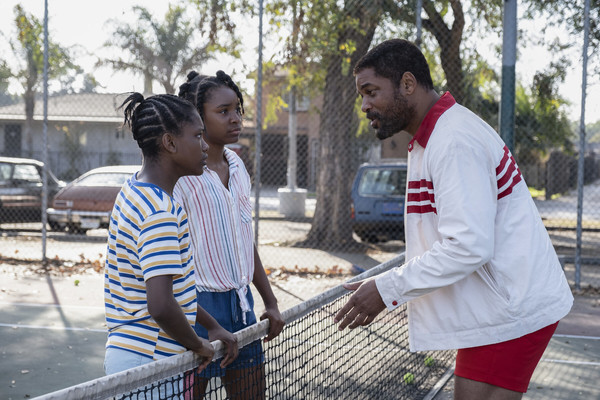Where do diamonds come from? For countless years, extreme heat and pressure transform inconspicuous carbon into firm crystals, which are then extracted from mines deep in the earth and polished to absolute brilliance. The best jewels require a particular set of conditions, along with great efforts and talent of a jeweler. King Richard tells a story about the making of the two diamonds of the tennis world — the Williams sisters. Even if you do not know the first thing about tennis, you have probably heard about Venus and Serena Williams. The sisters turned the tennis game on its head, winning 30 Grand Slam singles between them and 14 titles as a team. More importantly, they opened the way for people of color into a sport with a long history of white elitism. It was only a matter of time before the story of their triumph was adapted into a movie.

However, in contrast to other movies about sports legends, King Richard takes a somewhat unconventional approach to the narrative. The film tracks the journey of the Williams sisters through the eyes of their father and coach — Richard Williams, played by Will Smith — unfolding his controversial character along the way. In fact, the movie is not as much about tennis as it is about family and the parental determination to give their children a better life. We learn that Richard, who has spent his whole life amidst poverty and violence, made the decision to turn his children into tennis stars even before their birth, detailing the process in a 78-page plan. As a measure to keep the girls off the streets of their rough neighborhood, Richard and his wife Oracene keep a tight rein on Venus, Serena, and Oracene’s three daughters from a previous relationship. The girls are rarely allowed to idle, so Venus and Serena spend all of their time either studying or playing tennis. Meanwhile, Richard is stubbornly knocking on doors trying to get the girls a professional coach. We come to see that Venus and Serena’s success was in fact a team effort, with Richard and Oracene dedicating all of their time off work to train the girls, and the older siblings helping on the court.
The movie succeeds in making its viewers involved in the family’s fate, in part due to Will Smith’s outstanding acting, which he deservedly received the long-awaited Oscar for (aside from the incident with Chris Rock at the awards ceremony). Along with spot-on physical transformation, Smith persuasively depicts the complexities and contradictions of Richard Williams’s character. On one hand, the character shows extreme commitment by dedicating years of his life to the coaching of his daughters and being there for them as a father; on the other hand, we learn that he has abandoned his previous family of five children and has been very inconsistent with his attempts at business. Richard is stubborn and hard to work with, but thanks to the excellent writing of the movie, the viewer is able to understand the motives behind his decisions and the way poverty and his absent father have shaped him. His approach to parenting is also juxtaposed with that of the parents of white tennis players, who torment their children for any mistake, whereas Richard encourages his daughters to just have fun during the game. At the end of it all, we are led to believe that it is his decisions, made against the will of the professional coaches and public outrage, that lead to the rise of his daughters as tennis legends.
A separate applause should be given to Aunjanue Ellis as Oracene. We see Richard’s wife as a strong, hard-working woman, not afraid to stand up to her husband and point out his flaws, but supportive nonetheless. Some of the best scenes in the movie include the interactions between the couple. We do not see the characters of Venus and Serena showing as much personality as the characters of their parents, but the viewer gets infused with Richard’s support and belief in their talent, and the great quality of the recreated tennis scenes keeps one engaged with their progress.
As Venus and Serena were heavily involved in the production as executive producers, the positive side of Richard was naturally highlighted in the movie. However, although I enjoyed watching King Richard, I could not stop wondering about what would have happened if Richard’s plan did not work out: if the girls did not have it in them to become the stars, if the professional coaches never gave them a chance. From what we learn about Richard in the film, he would quit, leaving his daughters as another unsuccessful project, just like what he had encountered before. This thought could leave a parent watching the movie anxious of what the next steps should be if years of coaching do not lead their child to stardom, or how one should explain this failure to a child. The movie might not be a great inspiration for young athletes, but it is still an enjoyable feel-good movie that is worth your time.

